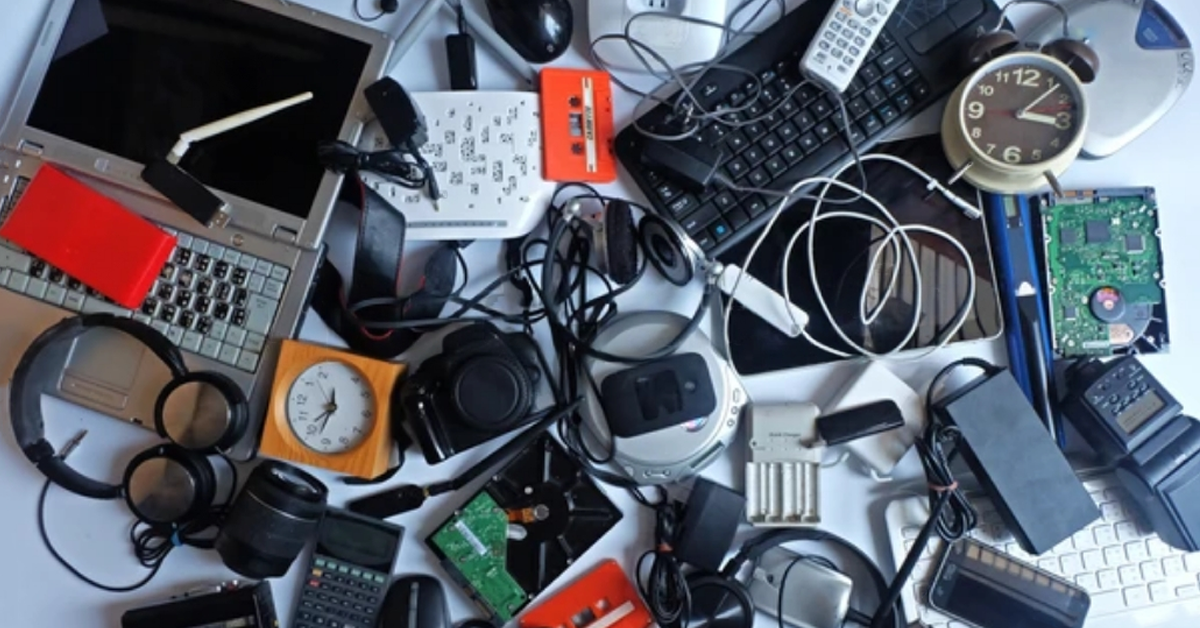Over the years, the advancement of technology has facilitated and improved the lives of billions of people around the globe. The rise in the mass production of Electronic and Electrical Equipment (EEE) and their relative affordability have contributed to their widespread adoption in households everywhere. By looking at the average household, you can quickly determine the number of electronic and electrical equipment used such as mobile phones, laptops, televisions, refrigerators, microwaves, etc. EEEs contain plastic components, commonly referred to as electronic plastics or e-plastics, which if not managed properly, can become a major problem and will contribute to the growing problems of e-waste.
Although some of the EEE such as televisions and refrigerators have a relatively long shelf life, others have shorter lifetimes due to damage or lack of usability. Some people discard these items, creating e-waste, but others may choose to repair, store, or donate them to extend their lifespan.
The State of E-waste in Lebanon
A report conducted by UNDP in partnership with the United Nations Institute for Training and Research and the Ministry of Environment indicates that in 2021, 63Kiloton of EEE was placed on the market in Lebanon, bringing the overall total of EEE to 659Kiloton across all households and businesses. During the same year, 46Kiloton of e-waste was discarded, and only 0.196% (0.09Kiloton) were reported to be recycled in an environmentally sound manner. The remaining 45.91Kiloton of e-waste ended up in either landfills or collected by the informal sector.
Despite the fact that the dangers of e-waste are quite known when it comes to the environment, it is crucial to address the presence of e-plastic within it which poses a threat not only to the environment and its sustainability but also to people’s lives in general.
E-plastic contains Polybrominated Diphenyl Ethers (PBDEs), highly toxic components, that function as flame retardants. The quantities and toxicological profiles of the flame retardants present in e-plastics are currently unknown, which is why they continue to pose a risk to human health. In addition to the PBDE, e-plastics may include Polyamides (PA), Polycarbonate (PC), and Polyethylene Terephthalate (PET), among many others. These different polymer blends are usually hard to separate and therefore become highly challenging to recycle through conventional means.
E-plastic Waste Treatment
Treating e-plastic waste is done by separating and neutralizing the Bromite that is found in them in a green manner. Currently, only one organization in Lebanon is working on addressing this issue; EPlastR, an alumnus of the DAWERR Activity funded by the United States Agency for International Development (USAID).
EPlastR team has created a process through which they can remove the toxic chemicals present in them and extract the purest form of polymers from the complex plastic blends. “Recycling e-plastic waste is extremely challenging, not only in Lebanon but also in the region because we lack the proper incinerators that handle highly toxic chemical products,” said Gaby Kassab, co-founder of EplastR.
The absence of specialized incinerators is one of many challenges facing the treatment of e-waste in Lebanon. What is crucial to consider is that e-waste in general and e-plastic waste, in particular, are subject to different behavioral traits locally. According to the aforementioned report, 65% of individuals choose to repair their EEEs once they are no longer functioning properly while the remaining 35% opt to donate them, store them at home, discard them with the regular unsorted waste, take them to collection points, sell them or exchange them.
The common handling of e-waste has significant repercussions on the environment and human health especially in the case of e-plastic waste which makes up a significant portion of e-waste. Many people choose to store their e-waste inside their homes, constituting a significant health hazard due to the toxic and odorless gases it generates, resulting in serious health conditions over time. Alternatively, when individuals choose to discard this waste, they either throw it out with the solid waste which in turn gets crushed releasing toxic fumes in the air, or they sell it to informal scrap collectors, the majority of whom see no value to the waste including e-plastics and do not necessarily adhere to environmental safety measures in discarding them. The waste either ends up in the forests, sea, and landfills, polluting the water and soil, or burned, polluting the air.
Furthermore, proper measures are not taken into consideration in the handling and the transportation of e-waste in general from its source to its final destination. It is critical to separate this waste from other waste types such as organic waste and to keep it dry from liquids such as oil or rainwater. This leads to the decomposition of the e-waste and the plastic that is present in them (e-plastic), where by the time it reaches the designated warehouses, it loses its value and can no longer be recycled.
Although there are laws in place regarding the management and recycling of e-waste in Lebanon, the Ministry of Environment and municipalities are unable to effectively address this environmental crisis due to a lack of resources and capacity for enforcement. To this date, there is a lack of accountability for the use of improper and hazardous methods for handling this waste “We are facing a major governance problem in Lebanon”, said Samar Khalil, Environmental & Chemical Safety Officer at the American University of Beirut. “We lack the proper infrastructure that allows the sorting of e-waste at source and properly transporting them to their end destination,” she continues.
Solar Panels Recycling
With a life span of 30 to 35 years and a return on investment of 5-10 years, solar panels have become a trend for Lebanese households and businesses that want to avoid excessive electricity outages. With large amounts being installed, some concerns regarding proper treatment of e-waste generated from batteries or the panel itself once completely used or damaged due to storms, stray bullets or other. For that, a common practice is to dismantle the structure to recycle metals, plastics and other elements like silicon and electronics. For batteries, (if included in the system), the common and existing practices in Lebanon go as follows:
- Lead acid batteries that are completely dead get recycled,
- Lithium batteries are sent off to centers to make sure they are completely discharged, then stored properly before shipping them to Genoa Italy (no current solutions for recycling them locally).
Value in E-plastic Waste
The recycling of e-plastics is done through separating the plastic components that are found in e-waste and through proper environmentally sound manner, decomposing its different elements to turn them into new raw materials that can be used in the creating of other products.
There is a great deal of value in recycling e-plastic waste. On the social level, properly handling this waste will significantly reduce the perilous impact on the environment and human health by diminishing the amount of toxic chemicals released into the air, water, and soil. On the economic level, e-waste, in general, is considered one of the considerable contributors to the circular economy. Recycling its plastic results in the production of high-grade virgin plastic that is used in producing plastic derivatives such as 3D printing filaments. Not only can these green plastic products replace the imports that are necessary to serve the Lebanese market, but they can also be exported to the region where the plastic industry is estimated at $2.3B. The production of plastic materials can contribute to job creation on the industrial and commercial levels.
E-waste embodies a danger to the environment and human health but eliminating them in this day and age, would be nearly impossible. This is why certain measures need to be taken to extend their lifespan and to ensure their handling in an environmentally sound manner, to protect human health.
Legislation should be put in place to mandate importers of EEE to take back their products for either recycling or repairing purposes when they reach the end of their lifespan to be recycled or repaired; allowing them to be used for new products or to repair old ones. The government should also require local manufacturers to make products with a lifespan of at least 10-15 years and have spare parts available for repair for the same duration. Moreover, import restrictions need to be put in place to prevent the entry of old products that contain hazardous materials into the country.
The Ministry of Environment and the municipalities need to be provided with the right resources to effectively enforce and regulate the proper handling and treatment of e-waste. The informal sector and solid waste companies need to be mandated and held accountable for the way they handle e-waste. They also need to be provided with clear guidelines on how to properly sort and transport it to ensure that its value remains intact.
A Collaborative Effort
The responsibility of e-waste does not solely lay upon the government. Consumers need to play an active role as well in understanding the dangers of storing and discarding e-waste in an unsound manner. They also need to be made aware of the importance of recycling e-waste and e-plastics, the dangers it poses to the environment, and the value it creates for the Lebanese economy. This is why it is critical for individuals to either recycle their EEEs properly by dropping them off at the designated drop-off centers or to refurbish them to extend their lifespans.
About DAWERR
DAWERR: Diverting Waste By Encouraging Reuse And Recycling is a five-year activity funded by the United Stated Agency for International Development (USAID) that aims to improve the social, environmental, and economic well-being of Lebanese citizens by establishing sustainable solid waste recovery and diversion programs in collaboration with municipalities throughout rural areas in Lebanon.
DAWERR is implemented by ECODIT in partnership with Berytech, Compost Baladi, and ECODIT Liban.










